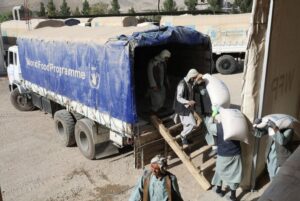FIROZKOH CITY (SW) – Some farmers in Ghor province admit to having limited knowledge of modern agricultural practices, yet they have managed to achieve better yields from their fruit orchards by employing traditional and local methods.
Two farmers in Ghor, who have allocated more than two jeribs of their arable land to apple orchards, say that they undertake operations such as weeding, using chemical and organic fertilizers, regular watering, and loosening the soil around the tree roots to enhance the productivity and growth of their orchards.
However, these farmers demand more support from the de-facto government and related organizations to foster agricultural growth in Ghor. “…but, we lack resources, face water shortages, and encounter various challenges. Without assistance, our trees may perish,” said 34-years-old Abdulrahim.
Farmers in Ghor state that they have received some short-term training sessions and minimal assistance from the agriculture authorities and certain organizations in the province, but it has not been sufficient for them.
Another farmer, Abdulrazaq, also said,”Our request is that the agriculture authorities assist us by providing insecticide and antimicrobial agents to ensure the survival of our trees.”
According to agricultural experts, while some farmers in the province have acquired vocational training in the field of agriculture, there are still farmers in need of further training for the production, processing, and maintenance of their fruit orchards.
Abdul Zaher Tawana, a Ghor-based agricultural expert, said that agriculture has seen significant growth in the province in recent years. However, the lack of agricultural knowledge has resulted in farmers achieving lower yields and selling their produce at low rates.
“Farmers lack knowledge of maintenance, processing, pre- and post-harvest operations, and product sorting. They need to be taught these skills. Unfortunately, during the harvest season, farmers pick their produce and do not understand the methods of preservation. Due to poverty and limited resources, they sell their products at very low rates, around 18 to 20 Afghanis per kilogram. The reason for this is the failure to provide modern agricultural knowledge to farmers and the lack of support for agriculture.”
According to Mr. Tawana, consecutive droughts in recent years have damaged fruit orchards, and in some areas, the orchards have even dried up. He adds that the de-facto government is responsible for providing assistance to farmers and creating conditions for the revival of dried-up orchards, alongside offering more guidance to farmers. This would enable farmers to increase their yields through this avenue, he said.
However, officials at the Directorate of Agriculture, Irrigation, and Livestock in Ghor say that technical and vocational teams of the directorate make efforts every year by launching educational programs and providing scientific and practical guidance at the central and district levels of this province to impart modern agricultural knowledge to the farmers.
Ghulam Mohammad Kazem Shahamat, the head of the directorate, added: “In the current year, several educational programs have been held in the center and districts of this province regarding effective methods of adapting to plant-based spices, prevention techniques for diseases and pests on fruit-bearing trees, fruit sorting methods, pruning techniques and their benefits, and grafting methods for some farmers.”
According to Mr. Shahamat, more than 3,600 hectares of land are allocated for fruit orchards in the center and districts of Ghor, where over 13,000 different orchards have been established.
The officials and experts in agricultural affairs in Ghor continue to emphasize that Ghor is a province with diverse climates, where certain types of fruit trees yield good results in some areas. They primarily mention trees such as apple, pear, apricot, peach, pistachio, grape, almond, walnut, and other fruit trees.
Experts believe that if standard agricultural knowledge is imparted to farmers, not only will the production of agricultural products increase, but the income levels of farmers will also improve.






